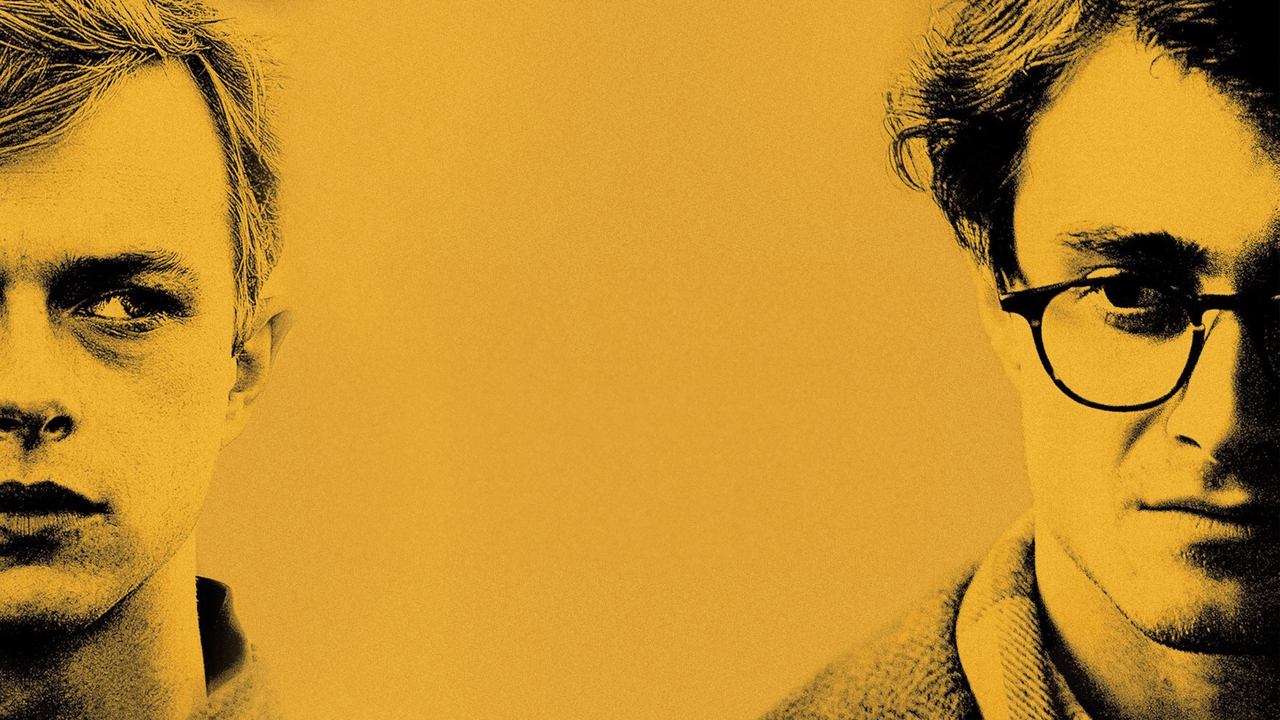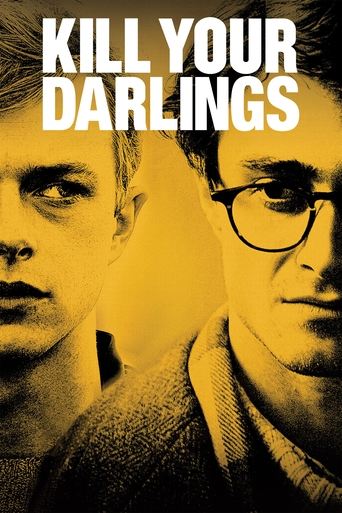

Plot so thin, it passes unnoticed.
... View MoreThis movie feels like it was made purely to piss off people who want good shows
... View MoreNot sure how, but this is easily one of the best movies all summer. Multiple levels of funny, never takes itself seriously, super colorful, and creative.
... View MoreThe movie really just wants to entertain people.
... View MoreBeat poetry is a subject that I am not familiar with and I am not entirely sure it exist in the parts I am from, but it's definitely an interesting subject to illustrate on film."Kill Your Darlings" discusses a murder that occurred in the 40's involving several monumental names of literature from Allen Ginsberg to Jack Kerouac, who would later go on forming what's called the Beat Generation. The acting was on par with the theme of the film, Dane DeHaan and Daniel Radcliffe, in particular, doing a fantastic job. The film debates topics such as sexual repression, recognition, reputation and exploration. As with most artists, the members of the Beat Generation certainly had a tumultuous and troublesome lifestyle that is depicted in the movie through love triangles, extravagant parties and misdemeanors.The film's screenplay started off well, describing Ginsberg's freshman experience at college, meeting with DeHaan's character, Lucien Carr, and surely enough the first steps of beat poetry were about to begin. However halfway through the script looses focus and ultimately doesn't lead up to anything, leaving the viewer with not much factual information about the great poetry generation."Kill Your Darlings" had substantial background information that could have been put to more use while still being captivating to the audience.
... View MoreThis is one of those movies that I can only understand and evaluate after researching about it. It all begins when Allen Ginsberg joins the prestigious and ultra-conservative Columbia University during World War II. There, he will meet a group of unconventional friends, with pleasure in breaking rules and confronting authorities. From this embryo, as I came to discover, would be born the "Beat Generation" (I had never even heard of it before watching). The script, however, seems indecisive. I've never been able to figure out whether the movie is about the "Beat Generation" or simply about Allen Ginsberg, the way he met his friends and the homicide related to them. This indefinition made the film tedious, with many dead moments that would have been cut off if there was some certainty on the subject. John Krokidas was unable to direct the film toward a clear and definite goal. He just went shooting.Another problem of this film are the characters. Everything revolves around Ginsberg, the only truly well-built character. All the others are sketches and drafts, and the way the actors worked did not help mitigate that. Dane DeHaan is a stranger to me, has managed to show psychological depth and showed some talent, but his character is too iconoclastic and unpleasant for me to care about it and the same can be said of all other characters and actors. Daniel Radcliffe, who was left with the main role, has a lot of talent and is the best actor here, but his character is quite unpleasant. Another problem here was the feeling that the film makes a kind of apology to homosexuality, something that I definitely don't approve. I know the mainstream thinking of our society tends to accept it as a different form of love, but I have the right to disagree and think otherwise without anyone being able to criticize me for it. We shouldn't live in mental dictatorships, in which mainstream dictates thoughts and opinions that we all must accept. Unfortunately, this happens and these apologies end up appearing very much like subliminal fascist or communist propaganda, used by authoritarian regimes that most people condemn. To what extent, using the cover of our democracy and mass media, does society force us to accept opinions or keep quiet if we disagree with them? It's a rhetorical question, but pertinent.By way of conclusion, I say that I expected something else from this film. A more focused, goal-oriented script would have been more interesting. A more neutral and natural approach to the characters' sexuality would have removed the apologetic and propagandistic burden I've mentioned. More elaborate characters, capable of building empathy with public, would have resulted in greater public involvement and increased our interest in what's happening. It's a boring, tiring movie that only those who enjoy counterculture or the Beat movement will appreciate. About the crime the film portrays, I was left with the feeling that it is a mere detail of the plot.
... View MoreWell done to Daniel Radcliffe for putting on the accent, he really suited the role for playing a Jewish poet whom I never in my life heard of! Wow, I tell ya, Allen Ginsberg had such a roller coaster love life with Lucien Carr. He really fell for such a bad boy didn't he?Mind you, I'm glad he wasn't with him anymore because he was a bad influence on him especially interrupting him with his education at Columbia university and the fact, his poor mother was sent in a Nuthouse all thanks to his dimwitted father! Sure the poor guy had enough on his plate without getting involved with Lucien, he probably would have a better life if he completed his education and look after the mother as best he can. Although it's good to have a love life too but not someone who isn't worth your time! Unfortunately he did get too involved with Lucien. At least he had a long time partner who was Mr Peter Orlovsky,a person that was also a poet and didn't seem to be a bad ol boy! He should've been with him from the very start even!I find the film was really chilling and it shows a very troubled love story between Lucien and Allen......
... View MoreIt's a story of the poet Allen Ginsberg's youth, from a nice Jewish kid in Patterson, New Jersey, to a dropout from Columbia University in 1944. This milieu -- and the neighborhood called North Beach in San Francisco -- produced the Beat Generation or Beatniks. Many of them, the ones we meet in this film, went on to considerable but ephemeral fame -- Jack Kerouac, William Burroughs, and Ginsberg himself, probably best noted for his poem "Howl." The title, "Kill Your Darlings," is from William Faulkner who, taken either by a fit of absurdity or maybe drunkenness, advised writers to delete those passages in their manuscripts that they liked best. If you like something, you wind up obsessed and your judgment fails you.I suppose that's the central theme of the film. Ginsberg falls for Lucien Carr and Carr rejects the importunings of his former lover, David Kammerer, and finally brutally murders Kammerer. I can understand Kammerer's obsession with Carr. Not that I understand eros between two men but I do understand obsession. It took me years to discover which major ocean port was in the middle of Czechoslovia.Daniel Radcliffe is Ginsberg and although he has the name of one of the seven sisters he looks like Ginsberg probably looked -- puny with horn-rimmed glasses. I don't know what Lucien Carr looked like but I can believe he was something like Dane DeHaan -- beautiful and effete. Michael C. Hall is Kammerer, who begins as a commanding figure and winds up a shivering supplicant. All the performances are adequate but Hall's may be the best of the lot. Kerouac is a marginal figure, a football hero and athlete who can also read and write. William Burroughs, Ben Foster here, should do a one-man show as a young Harry Truman.The atmosphere is rich, but the story doesn't quite come together, nor did I care much about who loved who. I don't quite know what happened towards the end. The director and editor turned the murder into the climax, understandably. But they rather spoiled it by giving us broad hints in flashbacks before what is supposed to be the full reveal. The shock they were presumably aiming at is diluted by the sometimes misleading adumbrations and by the generally confused sequence of events leading up to it. Besides, David Kammerer, as portrayed, was a ridiculous pain in the ass. And the title doesn't fit. Carr kills Kammerer, true, but Kammerer was no longer Carr's "darling". Just the other way round.And I'm guessing at the constant early references to a revolution in literature -- about how things get more and more separated from their center and need to be pulled back by revolutionaries -- is borrowed from Yeats' "The Second Coming", the business about the widening gyre, except that everything these guys do, like destroying the classics in the Columbia library and substituting pornography, isn't "pulling back" at all. They're not calling the falcon back. They're setting him loose. Literary chaos is slouching towards Bethlehem.Not that the stuff they produced can be easily dismissed. Ginsberg's "Howl", Kerouac's "On the Road," and Burroughs' "Naked Lunch" are unforgettable. They read poetry in front of jazz combos in North Beach and the Village. Is one permitted to ask about the aspirations of today's generation of college youths? Anyway, Ginsberg held his act together for the rest of his life, finally finding a steady lover. Kerouac became a smelly drunk, and Burroughs a junkie. But while it lasted -- what gusto!
... View More